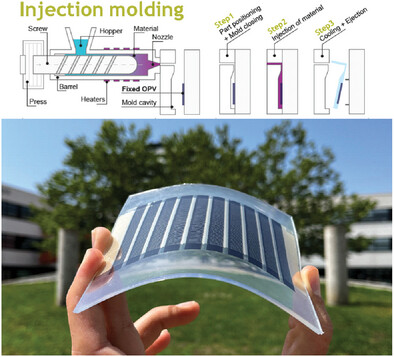Organic solar cells (OPVs) have huge potential for applications in power-generating windows, photovoltaics integrated into buildings, and even in wearable electronics. Although the photovoltaic efficiency of OPVs has been extensively studied, their structural properties have not been so extensively studied.

Now, a team at Eurecat’s Functional Printing and Embedded Devices division at the Catalonia Technical Center in Mataro, Spain, has been working on this aspect of OPV. Flexible solar cells are sensitive to mechanical wear and may require additional protection, such as being embedded in plastic parts, they said.
They investigated the potential of embedding OPVs in injection-molded TPU parts and whether manufacturing them at scale would be feasible. The entire manufacturing process, including the photovoltaic roll-to-roll production line, takes place in an industrial processing line under ambient conditions, using an injection molding process with a yield rate of approximately 90%.
They chose to use TPU to mold OPV because of its low processing temperature, high flexibility, and wide compatibility with other substrates. Choose Lubrizol’s polyether TPU Pearthane Clear
15N80 because of its high transparency and hydrolysis resistance.
The team stress tested the modules and they performed well under bending stress. The elastomeric nature of TPU means that delamination occurs before the module reaches its ultimate strength point.
The team suggests that in the future, injection molded materials could provide in-mold photovoltaic modules with better structural and device stability, and perhaps even provide additional optical functionality. They believe it has potential in applications that require combining optoelectronics with structural properties.



 微信扫一扫打赏
微信扫一扫打赏
